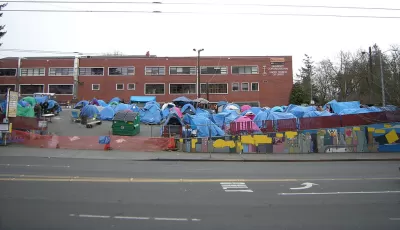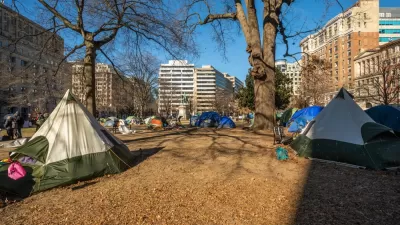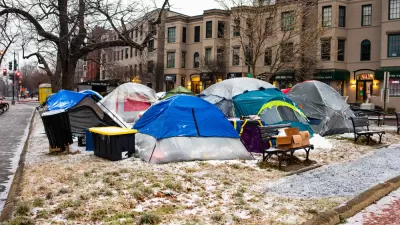Weeks after federal officials evicted unhoused people from a Washington, D.C. park, research indicates that similar actions, which usually come at a high cost to cities, have little impact on homelessness in the long term.

A report from the Department of Housing and Urban Development (HUD) and the Department of Health and Human Services (HHS) finds that ‘sweeps’ of homeless encampments, in which officials displace residents from established encampments, are “expensive and often of limited long-term effectiveness,” despite their popularity with many local politicians responding to pressure from community groups. Karen Kroll describes the report’s findings in Smart Cities Dive.
According to critics of the policy, “A sweep that doesn’t include services to help homeless individuals transition toward more permanent housing does little to address the underlying challenges that led to the encampment in the first place, say advocates for people who are homeless.” In the worst cases, “A sweep can set back individuals who were moving toward housing stability and, perhaps, working with a caseworker who knows where to find them.”
Activists say sweeps can be made less disruptive by providing ample notice, “intentional relationship-building” with residents to connect them to resources and services, and working with residents to help them keep their belongings, which often include important items like driver’s licenses. The report highlights a successful example from Denver, where, out of 360 people housed through a supportive housing program, 77 percent remained in stable housing three years later. “As the Denver experiment revealed, providing services that connect individuals to permanent housing is more effective than just clearing homeless encampments, a senior HUD official said.”
FULL STORY: Homeless encampment sweeps costly and of limited long-term effectiveness, according to federal research

Planetizen Federal Action Tracker
A weekly monitor of how Trump’s orders and actions are impacting planners and planning in America.

Restaurant Patios Were a Pandemic Win — Why Were They so Hard to Keep?
Social distancing requirements and changes in travel patterns prompted cities to pilot new uses for street and sidewalk space. Then it got complicated.

Maui's Vacation Rental Debate Turns Ugly
Verbal attacks, misinformation campaigns and fistfights plague a high-stakes debate to convert thousands of vacation rentals into long-term housing.

In California Battle of Housing vs. Environment, Housing Just Won
A new state law significantly limits the power of CEQA, an environmental review law that served as a powerful tool for blocking new development.

Boulder Eliminates Parking Minimums Citywide
Officials estimate the cost of building a single underground parking space at up to $100,000.

Orange County, Florida Adopts Largest US “Sprawl Repair” Code
The ‘Orange Code’ seeks to rectify decades of sprawl-inducing, car-oriented development.
Urban Design for Planners 1: Software Tools
This six-course series explores essential urban design concepts using open source software and equips planners with the tools they need to participate fully in the urban design process.
Planning for Universal Design
Learn the tools for implementing Universal Design in planning regulations.
Heyer Gruel & Associates PA
JM Goldson LLC
Custer County Colorado
City of Camden Redevelopment Agency
City of Astoria
Transportation Research & Education Center (TREC) at Portland State University
Jefferson Parish Government
Camden Redevelopment Agency
City of Claremont





























